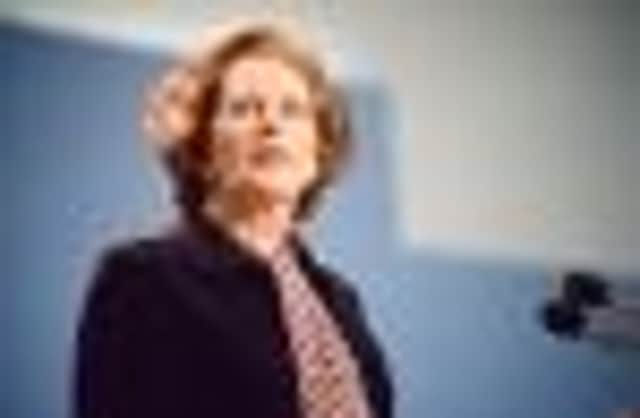Trevor Davies: The moment to seize the economic initiative against a corrupt elite


ARE we at one of those moments in history when the world might shift?
It happened in Britain after the 1939-45 war when all the common trials and tribulations of conflict suddenly opened the door for the NHS, state pensions and the welfare state. It happened in the 1960s when personal expression and freedom suddenly blossomed. Could something, we know not what, be about to shift again?
Advertisement
Hide AdAdvertisement
Hide AdWe need it. The scandals of overweening corporate power are all around us. It isn’t just that the incompetence of G4S over their Olympic guard duties is followed by their still claiming their full $57 million (£36m)fee. The sense of being ripped off by big over-powerful companies – banks, utilities, airlines – is personal. Some, we suspect, may even be crooks. HSBC, and they are not alone, knowingly laundered the money of big-time drug dealers. Other banks fixed interest rates. Rich investors bought the debt of the poorest countries and then went to court to suck from them great multiples of what they first owed.
The richest 100,000 people in the world, no more, have salted away in tax havens well over $20 trillion – more than the whole American economy - depriving us all, and especially poor countries, of prosperity. In Britain the richest 1,000 have boosted their total wealth in 10 years by an extra £250 billion – enough to pay off our debts.
If we’d kept the same income distribution as we had in 1979 then most people in this country (but not the top 1 per cent) would be nearly £2,000 a year better off.
How did we get to this dreadful state? Margaret Thatcher was elected in 1979. Shortly after, she and Ronald Reagan decided to stop regulating the banks, the finance houses, the investment funds. Their “Big Bang” in global financial markets of 26 October 1986 is the reason we have our troubles today. Their actions were based on the hugely mistaken but hugely powerful economic doctrine of “get government off our backs and give markets the freedom to work” – a doctrine that created vast wealth for the top few, destroyed investment in the real economy and left the rest of us to pick up the pieces.
And we all fell for it. When decent building societies converted to banks, most of us rushed to vote yes and pocket the “windfall”. Without exception those new “banks” failed or have been swallowed by bigger banking failures. Most of us, in one way or another, bought into the doctrine that free markets are the best markets. We’ve allowed the poor to be blamed for their own poverty, allowed a society to grow where disabled people are called scroungers to their face, allowed trade unions to dwindle and be vilified. And that suits the super-rich no end. Few challenge the claim of right by the mega-rich to move millions around the world to avoid tax – because we’ve all done it a bit, moved our savings to the Isle of Man or bought “VAT-free” CDs from Jersey.
Like all of us, politicians too have fallen slave to those loud selfish voices and the doctrines they peddle. But are we at one of those moments when the world might shift?
Perhaps we are. When even the ministerial successors of Thatcher in today’s Conservative-led government can suggest fines for accountants who don’t divulge their fancy schemes to keep rich people from paying tax, then perhaps we are seeing something new.
The public mood – that’s you and me – is certainly changing. Look at the success of protest group 38 Degrees in persuading McDonalds and Coca Cola not to use the tax dodges set up for them to milk their exclusive Olympic franchises. Look at the successes of UK Uncut and the Occupy movement in shaming corporate bosses about their tax doges and financial excesses.
Advertisement
Hide AdAdvertisement
Hide AdBut more than a few fines and bad publicity are needed. Let’s aim to rid ourselves of those pernicious dominant voices and find a way to where every voice of every citizen is equal, where our economy serves all and not just the rich. In other words - re-assert our democracy.
First, let’s make every tax return from every citizen a public document. That scares us. Our income is private between us and the taxman, we say. But it’s not. Paying our taxes, and paying them equitably, is the price we each pay for a fair and civilised society and a sign of our citizenship. If tax returns of the rich are open to scrutiny, alongside all the Paye workers, then, if they cheat, the consequences of the law are there. It’s done in Sweden – and their democracy has not exactly collapsed.
Second, let’s try and manufacture a rule whereby we can tax every accountancy firm every time they devise a new tax-dodge scheme and every time they recruit someone to it. If it’s legal but “morally wrong” then here’s a way to deal with it. It was Jimmy Carr’s scheming accountants who should have been in Cameron’s “moral outrage” dock more than him.
Third, we’ve pretty well nationalised the Royal Bank of Scotland now – we own 82 per cent of it. So let’s turn it into a genuine public investment bank, where manufacturers and traders around the country can receive the long-term investment they need. Let’s divide it up and make it regional so local managers get to know their local businesses. .
Let’s put workers on company boards, like Germany, put proper power into the hands of towns and cities, like Norway, give tax breaks to co-operatives and mutuals as they do in Spain.
There’s a moment to seize and to shape.
• Trevor Davies is honorary professor in urban studies at the University of Glasgow and was a Labour councillor in Edinburgh.